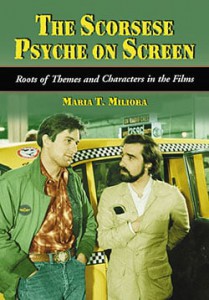The Scorsese Psyche on Screen
Roots of Themes and Characters in the Films


Average rating: ![]()
| 0 | rating | |
| 0 | rating | |
| 0 | rating | |
| 0 | rating |
Your rating: -
Book Presentation:
This study examines the life and work of acclaimed film director Martin Scorsese, showing that his films reflect his experiences growing up in a Sicilian-American-Catholic family in the tough neighborhood of New York’s Little Italy. The study links the personal Scorsese, his roots, and his ethical and religious attitudes.
The work examines many films from Boxcar Bertha (1972) to Bringing out the Dead (1999), with special attention given to Gangs of New York (2002) as a vehicle for Scorsese’s return to his roots. The Last Temptation of Christ (1988) is analyzed as a template for the Scorsese opus.
The study begins with a biography of Scorsese, and then describes his films from 1963 to 2002, providing plot summaries, themes, and characters. The body of the work analyzes films in terms of male sexuality, narcissism, violence, and the place of women in the director’s personal and cinematic world. In addition to showing how the themes of Scorsese’s films derive from his roots, the study offers psychological analyses of his focal characters. It provides a psychological basis for understanding the dialogue and actions of the characters in the context of their respective film stories. The study shows that Scorsese’s films express the values that define his worldview, which include his attitudes about masculinity, aggression, and violence.
About the Author:
Maria T. Miliora is a professor of chemistry at Suffolk University in Boston and maintains a private practice in psychoanalysis. She has published books on psychology, film, and literature, as well as clinical articles.
Press Reviews:
"a revealing expose on the legendary director…a pleasurable time spent exploring Scorsese’s dark side. Through a trained analyst’s eye, we feel as if we’ve been sitting next to Scorsese on the psychiatrist’s couch all these years"—Scorsesefilms.com.
See the publisher website: McFarland & Co
See the complete filmography of Martin Scorsese on the website: IMDB ...
> On a related topic:
Martin Scorsese (2025)
The Iconic Filmmaker and His Work
by Ian Nathan
Subject: Director > Martin Scorsese
Hollywood's New Yorker (2014)
The Making of Martin Scorsese
by Marc Raymond
Subject: Director > Martin Scorsese
The Passion of Martin Scorsese (2010)
A Critical Study of the Films
Subject: Director > Martin Scorsese
Art Rebels (2019)
Race, Class, and Gender in the Art of Miles Davis and Martin Scorsese
by Paul Lopes
Subject: Director > Martin Scorsese